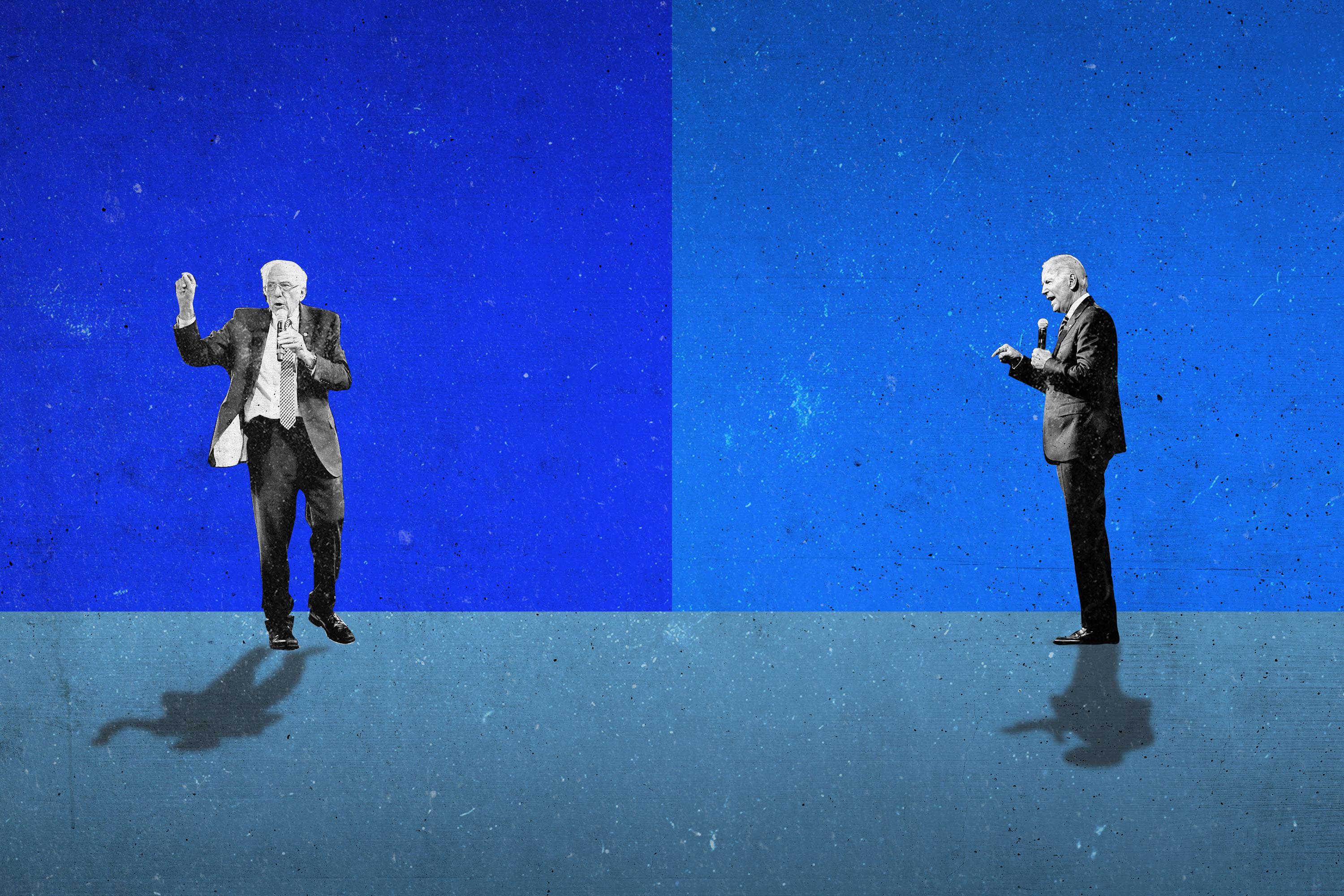
On Sunday, former vice president Joe Biden and Vermont Senator Bernie Sanders will appear on stage in Phoenix for the 11th Democratic presidential debate in this election cycle. It’ll be the first one-on-one confrontation in a once-crowded nomination contest, which has always, essentially, come down to Biden vs. Sanders: progressive restoration versus left-wing revolution.
But so much has changed in the two weeks since Biden and Sanders last stood together on a debate stage in Charleston, South Carolina, before the state’s primary and Super Tuesday. Former South Bend mayor Pete Buttigieg, Minnesota Senator Amy Klobuchar, former New York City mayor Mike Bloomberg, and Massachusetts Senator Elizabeth Warren have quit the race. Biden leads Sanders in the DNC delegate tally, the national polls, and most statewide polls ahead of the rest of the party’s March contests, including Michigan, Florida, and Ohio. In the 10 days since South Carolina voted, Buttigieg, Klobuchar, Bloomberg, California Senator Kamala Harris, and New Jersey Senator Cory Booker have endorsed Biden. Warren declined to endorse Biden or Sanders after ending her campaign—she has a strong policy affiliation with Sanders, even if her supporters include so many former Hillary Clinton voters who may well favor Biden over Sanders.
On Tuesday, Biden and Sanders will compete in six states, including Michigan, which, given Biden’s 15-point lead in the state, may well mark Sanders’s last stand. Four years ago, Sanders upset Hillary Clinton in Michigan in the Democratic primary despite polls predicting Sanders would lose the state by an average of 21 percentage points. If Sanders loses Michigan to Biden on Tuesday, it will likely spell the end of his campaign; Biden will have consolidated the older, moderate constituencies that Clinton alienated four years ago. In 2016, Sanders portended Clinton’s broader weakness in pivotal states: Donald Trump, too, upset Clinton in Michigan in the general election. Sanders and Biden have spent the past few days hunkered down in the state, which has been a sore spot in Democratic presidential politics since Clinton’s poor showing against Trump in 2016.
For the progressives who back Sanders, Clinton’s failure against Trump proved the party’s foolishness in assessing Clinton’s inherent “electability” as a moderate figurehead. Past Democratic presidential candidates, such as Barack Obama and Clinton, have banked on constituencies which the party has otherwise forsaken in its policy-making. This became evident in Michigan in 2016, when Sanders and Trump underscored Clinton’s support for free-trade deals such as the Trans-Pacific Partnership, which Clinton helped negotiate during her four-year term as Obama’s secretary of state. A few months ago, Biden, too, reversed his support for the TPP despite having helped push the trade deal through Congress four years ago when he was Obama’s vice president. (President Trump withdrew the U.S. from the TPP less than a week after his inauguration.) In recent weeks, Sanders’s supporters have resurfaced Biden’s assessment of the Clinton vs. Sanders matchup: “I think that Bernie is speaking to a yearning that is deep and real, and he has credibility,” Biden told CNN in January 2016. “It’s relatively new for Hillary to talk about that. Hillary’s focus has been on other things up until now. No one questions Bernie’s authenticity on those issues.” Now, Biden argues, four years of Trump’s presidency has led to more voters yearning for normalcy than yearning for universal health care, free college, and trade protectionism.
For Biden’s most steadfast supporters, Clinton’s defeat was a historical fluke. It’s been rationalized—and trivialized—by so many excuses: Clinton’s personal shortcomings, her party’s modern misfortune in the Electoral College, and the broader geopolitical conflagration which has empowered right-wing populists worldwide. Clinton’s failure against Trump only further confirms her party’s indispensability as a bulwark against populism—not a vanguard in its own right. Theoretically, Biden overcompensates for Clinton’s most persistent shortcomings: He’s an affable party standard-bearer who has consistently rated higher than Clinton and Trump in national favorability polls. In 2020, Sanders has improved his standing among the younger black and Latino voters who assured his victories in Nevada and California. He leads the younger, progressive voters who regard Biden’s likely nomination as the party’s latest retreat from a righteous course. Worse yet, they fear it will confirm the party’s second general election blunder against Trump. Sanders thinks he can turn the working class against Trump. Biden thinks he can turn out his older, moderate supporters more reliably than Sanders can his young, progressive base.
If the Democrats lose in the general election, whether it’s Sanders or Biden leading the ticket, the party’s failure may well break the left-liberal impasse, which has stunted the party’s rehabilitation against Trump and his omnipotent GOP. There’s an ultimatum on the table, and the stakes are high for both candidates: This is your last chance. Sanders losing to Trump would spell the left’s indefinite demise in presidential politics. New York Representative Alexandria Ocasio-Cortez, elected on the momentum of Sanders’s 2016 presidential run, might peak as a legislative iconoclast while Buttigieg and his moderate peers go on to win the party’s presidential nominations for the foreseeable future. Biden losing to Trump should dispel the prevailing bias toward “moderate,” “electable” nominees. For half a century, Democrats have recalled Richard Nixon routing George McGovern more vividly—and fearfully—than they’ve reconsidered the party’s failures in presidential elections against Ronald Reagan, George H.W. Bush, George W. Bush, and Donald Trump. So, perhaps, the stakes are as uneven as they’ve ever been for the left-wing insurgents confronting the party’s senior leadership: Biden stands to lose a general election to Trump. Sanders stands to lose so much more.

